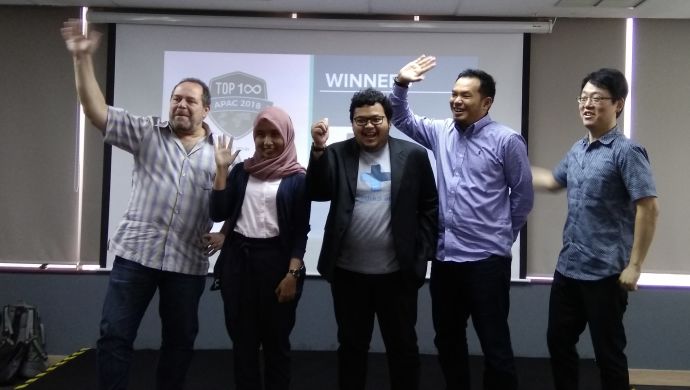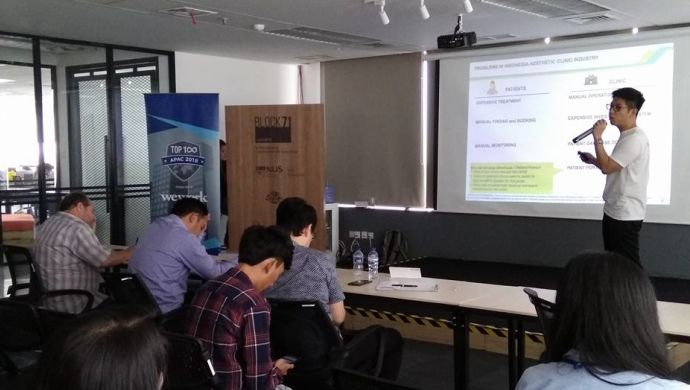An agritech startup came out as the winner of Judges’ Choice category at Top100 Indonesia, but the sector is not the only one gaining a momentum in the country

Jala and Medika with panel of judges muru-D’s Paul Meyer, Rekanext VC’s Khairu Rejal, and KK Fund’s Kuan Hsu
The Top100 Indonesia Qualifier Roadshow concluded on Tuesday with agritech startup Jala being announced as winner of the Judges’ Choice category, followed with the announcement of doctor booking platform Medika as winner of the Fan Favourite category.
During the event, where 15 Indonesia-based startups presented their businesses to a panel of judges, e27 noticed five notable trends that might give us a clue about where the local startup community is heading.
Here they are:
1. Agritech startups are rising in popularity
In 2016, President Joko Widodo launched a partnership with two startups and a developer community to produce apps to help farmers in the country.
In a different occasion, the president had also named several startups that he believed will support the country’s digital industry ambitions; the majority of the startups are working in the agritech sector.
Though many Indonesian agritech startups that have raised funding in the past one year are working in the e-commerce sector —connecting farmers to customers— the opportunity is basically limitless.
In addition to Jala, the roadshow yesterday also saw a presentation by TaniJoy, which aims to help vegetable farmers get capital through a P2P lending platform.
2. The muse: Car owners
Car ownership in the country continues to grow rapidly; so is its mind-blowing congestion problems. This issue continues to become a source of inspiration for tech entrepreneurs, with unicorn startups such as Go-Jek helping its users cut down commuting time by the use of motorbike taxis.
Digi ID is one of those startups. With the goal of helping drivers tackle the notoriously congested parking lots in shopping malls, the startup enables drivers to find and book parking spots prior to their arrival. Since the startup is not the only one playing in this sector, we can expect to see more of them coming up and gaining traction.
Also Read: Meet the 14 startups pitching at the TOP100 Philippine Qualifier
3. Regional potential
There is a myth that Indonesian startups would rather focus on its home market than expand internationally, thanks to the size of its population and the potential it has. Even unicorns such as Tokopedia has spoken about focussing on Indonesian islands outside of Java; the other unicorn Go-Jek has only started executing its plan to expand in Southeast Asia.
But as one of the startups presenting at the roadshow, Authentic Guard has proven this myth wrong. Helping brands protect their products against counterfeiting, the startup has ongoing projects in Nepal and Vietnam, and is planning to enter Thailand.
4. Helping hospitals manage themselves
Despite its challenges, the healthtech sector in Indonesia provides its own unique challenges and opportunities. Support for the sector has also begun pouring in from investors, such as with the launch of healthtech-focussed coworking space H Cube.
As seen in the two healthtech startups presenting at the event, Medika and MyClinicalPro, platforms that help hospital and clinic management seem to have found its niche. However, it remains to be seen which one shall come out as the winner in the market.

MyClinicalPro, one of the healthtech startups presenting at the Top100 Indonesia Qualifier Roadshow
5. The offline element
In an interview with e27, Patrick Yip of Intudo Ventures has spoken about the venture capital firm’s interest in businesses in Indonesia that merges online and offline elements.
The roadshow also seen the appearance of startups working with the O2O elements: from sports venue booking platform Doogether, one-stop platform for competition organisers Winnerz, agents-based printing platform Tjetak, to shopping mall data analytics platform MallSini.
The post 5 notable startup trends seen at Top100 Indonesia Qualifier Roadshow appeared first on e27.